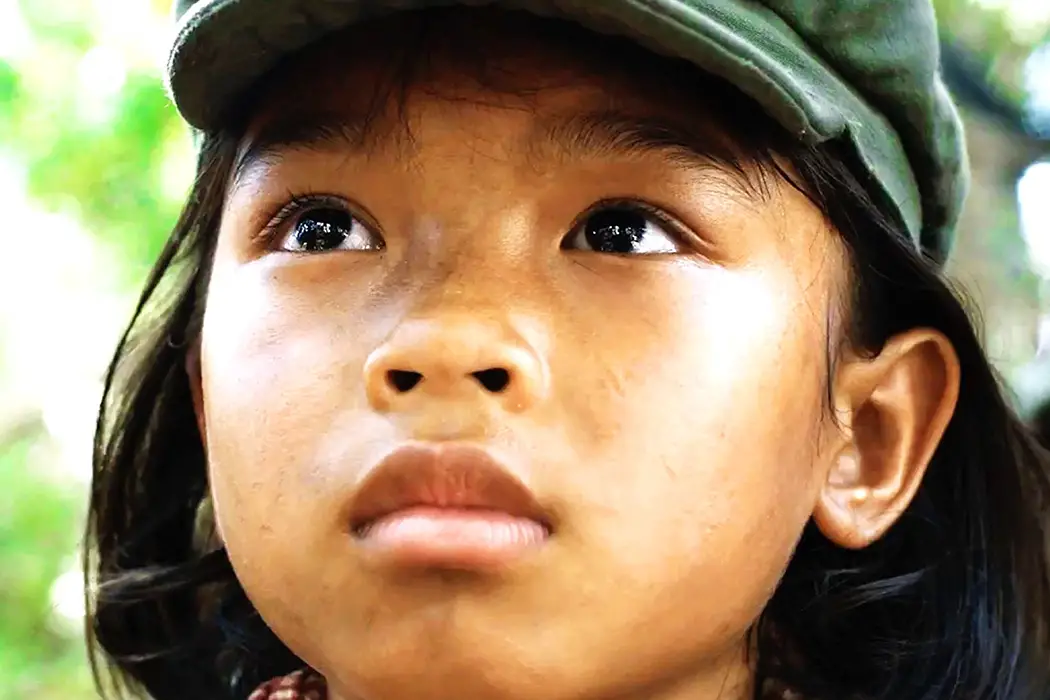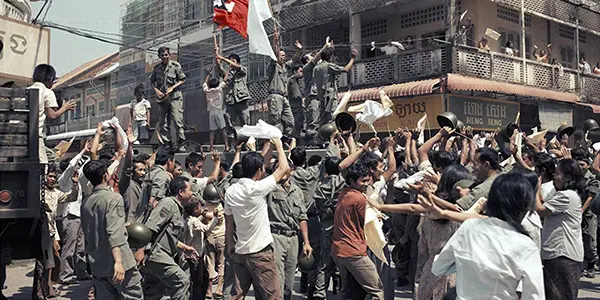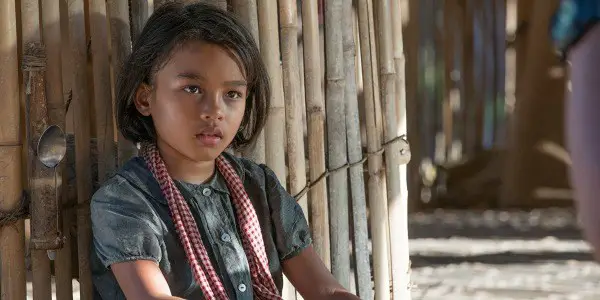FIRST THEY KILLED MY FATHER: Jolie’s Powerful Passion Project

Corey is a Welsh wizard and self-proclaimed cinephile with a…
After two years since her last directorial run-out in 2015’s By The Sea, actor-turned-director Angelina Jolie returns to the director’s chair for First They Killed My Father, a powerful Netflix Original biopic based on the memoirs of Loung Ung, a now human-rights activist; who was just 5-years of age when the communist regime Khmer Rouge would change her life forever. The cruel regime, led by Marxist leader Pol Pot, became responsible for the mass genocide of over 2 million Cambodians, a subject matter that Jolie both expertly, and respectfully, handles.
In order to fulfil her artistic vision, Jolie turned to streaming giants Netflix, who are no stranger to investing big bucks in auteurist projects (note Okja and Beasts of No Nation), and with Jolie‘s vision requiring a $24 million budget and an extensive 60-day shoot, retreating to the streaming service seemed pragmatic.

Netflix gracefully allowed Jolie to fulfil her passion project, resulting in what would be the biggest film ever to be shot in Cambodia, and a true contender for Best Foreign Language Film at the forthcoming Academy Awards.
There’s clearly inspiration from 1984’s The Killing Fields, a story about an American journalist trapped in Cambodia during Khmer Rouge’s tyrannous reign, yet Jolie avoids ‘Americanizing’ her story, swapping out the American lead in favour of a young and innocent Cambodian girl.
Jolie‘s narrative begins in 1975 through the eyes of young Loung Ung (Sareum Srey Moch). The young girl lives a happy life, living in a loving home with family all around her, dancing majestically to the music blaring from the speakers. It’s not until the arrival of the Khmer Rouge militants that the tone shifts; the music dies out, the people flood the streets, and Marco Beltrami‘s sombre and eerie score lurks malevolently into the scene.
“No rich, no poor. No class. We are all the same now.” Loung’s family are forced from their homes, yielding their possessions and eradicating their individuality, coerced into working under gruelling conditions; long labour, rationed food. A tender scene whereby the family share two fried c*ckroaches, a supposed luxury, is both a touching and poignant moment.
Jolie’s Expert Direction
Despite the fact that these truly appalling events occurred on a national, widespread level, Jolie‘s film explores this narrative through the eyes of just one person, and by collaborating with Oscar-winning cinematographer Anthony Dod Mantle, whose previous successes include Slumdog Millionaire and 127 Hours, she manages to tell the story of Joung Ung with such delicacy and grace. Guided by a catalogue of over-the-shoulder, POV, birds-eye-view and close-up shots, the camera never exits Loung’s field of vision; we see what she sees and we hear what she hears, a technique similarly utilised in Laszlo Nemes‘ Son of Saul.
Whilst Jolie‘s direction pans a focus on the beauty of Cambodia, particularly the exoticism and vibrance of the sweeping landscapes, she also holds no punches in her depiction of the cruelty shown towards the Cambodian people. The explicitness shown on screen, from the skeletal figures roaming around the camps to the abhorrent executions, is an indication that Jolie has something to say about these tragedies, and we are listening loud and clear.
Jolie‘s decision to employ over 500 Cambodians during the production of her film, including the all-Asian, non-professional cast, was a choice that was met with some pretty sturdy opposition, with many claiming her approach to auditioning the cast was both immoral and unethical. Pushing aside the controversy for a moment allows you to marvel at the incredible performances on display, especially from debutant Srey Moch.

Moch plays the young Ung with such purity and curiosity; providing a silent and suppressed demeanour that is in constant conflict with the demons around her. Showing no signs of vulnerability, there is a true sense of innocence in her portrayal, an innocence that is overshadowed by such tragedy and malevolence; a trait also shared by Christian Bale‘s character in Spielberg‘s Empire of the Sun.
But labelling those on screen as ‘characters’ feels false. The non-professional cast show no signs of their inexperience through their tremendous and heartfelt performances, with their organic and provocative displays of emotion feeling nothing short of genuine, a testament to Jolie‘s eye for talent.
First They Killed My Father: A Step in the Right Direction
This is undeniably a big leap forward for Angelina Jolie‘s directorial career and her reputation as a visionary auteur, but perhaps more importantly, this is a monumental success for Netflix; proving once and for all that they can compete with modern cinema.
First They Killed My Father is a powerful piece of filmmaking by Jolie, and I can’t wait for her next adventure.
What do you think? Will Jolie’s film be included in your ‘best of 2017’ lists? Let us know in the comments!
Does content like this matter to you?
Become a Member and support film journalism. Unlock access to all of Film Inquiry`s great articles. Join a community of like-minded readers who are passionate about cinema - get access to our private members Network, give back to independent filmmakers, and more.
Corey is a Welsh wizard and self-proclaimed cinephile with a love for all things film related, who holds a degree in Film and Media Communication. Ooo, fancy.












